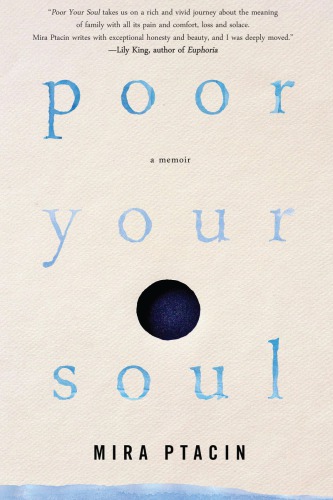
Poor Your Soul
A Memoir
فرمت کتاب
ebook
تاریخ انتشار
2016
Lexile Score
910
Reading Level
4-5
ATOS
6.2
Interest Level
9-12(UG)
نویسنده
Mira Ptacinناشر
Soho Pressشابک
9781616956356
کتاب های مرتبط
- اطلاعات
- نقد و بررسی
- دیدگاه کاربران
نقد و بررسی

November 16, 2015
Ptacin is 28 and newly pregnant at the onset of this nicely paced, moving memoir of loss and renewal. Recently uprooted from an editing job in Maine, the Michigan-born author came to Manhattan to attend a writing program and live with her fiancé, an engineer whom she met through an online dating service. Ptacin was shocked and ambivalent about the unplanned pregnancy (she had been on the Pill), but the couple readied for parenthood and eventually wed. Through flashbacks, she shares her Michigan upbringing in Battle Creek, and a loving family that includes an endearing physician father, a restaurateur mother who also holds a physics degree, and two siblings. As a teen, the author hangs out with the “bad kids,” runs away from home for a brief period, and returns to make amends just as a tragic accident takes her young brother’s life. Yet another tragedy befalls Ptacin as an adult; an ultrasound reveals that Ptacin’s baby that it will not survive outside the womb, and she then must choose a method of terminating the pregnancy, an emotionally painful process she describes in detail. “Poor your soul” is a phrase Ptacin’s mother uses, and it’s an apt title for a book that delves deeply into the nature of grief. Ptacin’s memoir is a raw and absorbing story of family fortitude and a young woman’s struggle to confront and accept the unexpected.

Starred review from December 15, 2015
An unexpectedly hopeful, but never mawkish, tale of love and loss. The literature on death is vast, that on the grieving process somewhat smaller, that concerning teratology--in the grimly archaic language of medicine, the birth of "monsters"--smaller still. With grace and compassion, Ptacin describes the roller-coaster plunge from cautious elation to profound sorrow as romance ("We fell in love. Exposed kneecaps and collarbones, and entire evenings spent devouring one another; we were like wild forces") yielded to pregnancy. Then pregnancy became ever fraught as the first "abnormal" tests began to come in: "I thought maybe it was my fault," the author writes of the first iffy report, "maybe I forgot to take my folic acid one morning, maybe I was too stressed and cantankerous and it was poisonous to the baby." After reeling off a list of deformities--spina bifida, clubbed feet, irregular heartbeat, lack of brain development--the doctor asked whether Ptacin still wanted to know the sex of her baby. The question then became what to do, how to reconcile modern medicine and the health of the mother with Catholic doctrine and the beliefs that she, her beloved, and her family held--not to mention the opinions of those with no stake in the matter. "If I choose to terminate," she writes, "I'll be what the pro-lifers hate." Her choice is heartbreaking and shattering, and it makes for difficult reading; in the end, Ptacin suggests, there is nothing to say, only acknowledgment that something terrible has happened and the need to summon the will to go on. In all this, the author's Polish-immigrant mother emerges as a wise counselor and moral anchor: "Poor baby. Poor her soul. It is very sad," she said, and that is just right. But Ptacin herself, who is neither heroic nor helpless, also rises in our estimation, even as she sinks in her grief. Beautifully written, at just the right emotional pitch. Of interest to all readers but likely to find a home among bereaved mothers.
COPYRIGHT(2015) Kirkus Reviews, ALL RIGHTS RESERVED.

December 15, 2015
Ptacin's memoir is beautifully written, but it can be frustrating. It starts oddly, with an irrelevant anecdote about her building superintendent and his Sunday liaisons with call girls. It takes 148 pages for Ptacin to get to the central drama, her pregnancy, during which a 20-week ultrasound reveals an irregular heart structure, zero brain development, spina bifida, and clubbed feet. A genetic counselor tells her that her baby will be unviable outside the womb, with no chance of survival. Ptacin (who teaches memoir writing to women at the Maine Correctional Facility) explains how she chose among three less-than-ideal options: ending her pregnancy, inducing early delivery, or doing nothing and most likely miscarrying. After she makes her decision, Ptacin tells herself, Lilly is gone, and it's not my fault. But she wallows in her misery, eating peanut-butter ice cream and shouting at her long-suffering husband. Finally, she sees a therapist, who diagnoses her as clinically depressed with post-traumatic stress disorder. Then a friend gets her to start jogging, and she and her dad complete a marathon together. A feel-a-little-better story for women who find themselves in Ptacin's painful situation.(Reprinted with permission of Booklist, copyright 2015, American Library Association.)

























دیدگاه کاربران